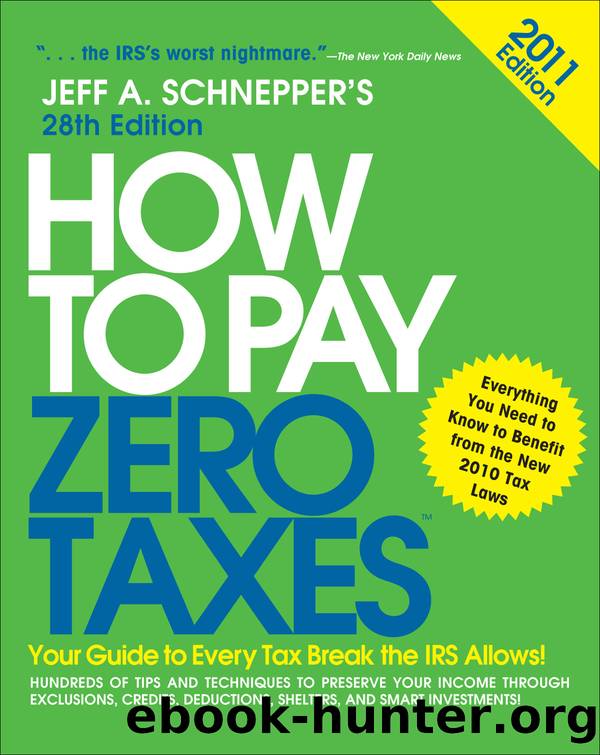How to Pay Zero Taxes 2011 by Jeff A. Schnepper

Author:Jeff A. Schnepper
Language: eng
Format: epub
Publisher: McGraw Hill LLC
Published: 2011-01-15T00:00:00+00:00
130 Authorâs Delight
An interesting income allocation technique was made possible by an Internal Revenue Service ruling (Ltr. 8217037). A writer signed a contract with a publisher for royalties based on sales of a completed book. The contractual rights owned were then transferred to trusts for the benefit of minor children.
The IRS ruled that this was not a transfer of income, but rather of income-producing property. As long as the income was not used to meet the support obligations of the parents, such income would be taxed only to the trusts/children! In Letter Ruling 8444073, an author assigned to his child all royalties and interest in his publishing contract within 10 days after completing the book. The IRS again ruled that the authorâs child, not the author, would be taxed on the book royalties. Be careful, however: If an author assigns less than the entire contract, the IRS could assert the assignment of income doctrine to tax the income [see Lewis, 45-2 USTC Para. 9348, 34 AFTR 124 (CA-3, 1945)]. Both the contract and the royalties must be assigned: An assignment of the royalty income alone would not be a complete assignment of all of the authorâs property.
Note, however, that in IRS Letter Ruling 8444073, the IRS ruled that if the author was required in the contract to make revisions to the book, and no additional compensation were received for such revisions, the royalties would represent, in part, compensation for the authorâs services and would be taxable to that author. The measure of the compensation would presumably be what the publisher paid someone else to do the revisions. The solution to this problem is to have a separate contract or agreement specifying additional or different compensation for revisions. In addition, note that the rule that expenses incurred by an author in writing a book after 1986 must be capitalized and deducted over the life of the income stream of that book (Section 23[b] of the Tax Reform Act of 1986) has been repealed. The IRS had ruled that an author could deduct 50 percent of those expenses in the first year and 25 percent in each of the subsequent 2 years, in lieu of total income stream capitalization (Notice 88-62, 1988-22 I.R.B.). That ruling is now obsolete.
Download
This site does not store any files on its server. We only index and link to content provided by other sites. Please contact the content providers to delete copyright contents if any and email us, we'll remove relevant links or contents immediately.
The Social Psychology of Inequality by Unknown(2311)
The Plant Paradox by Dr. Steven R. Gundry M.D(2040)
The Writing on the Wall by Anselm Jappe(1759)
Working for Yourself by J.D. (Nolo) Stephen Fishman(1478)
Every Landlord's Legal Guide by Janet Portman & Stewart Marcia & Ralph Warner(1325)
The First 20 Hours: How to Learn Anything ... Fast by Kaufman Josh(1304)
ADHD on Trial by Michael Gordon(1241)
Decisive by Chip Heath(1201)
Drafting Contracts: How and Why Lawyers Do What They Do, Second Edition by Stark Tina L(1171)
Working for Yourself by Stephen Fishman J.D. (Nolo)(1139)
The Economist Aug 8th 2015 by The Economist(1123)
Restitution by Restitution(1115)
The Economist Aug 29th 2015 by The Economist(1098)
A Practical Guide to International Arbitration in London by Hilary Heilbron(1084)
The Lord of the Rings: The Fellowship of the Ring, the Two Towers, the Return of the King by J. R. R. Tolkien(1083)
Intellectual Property Strategy by John Palfrey(1082)
Collusion by Luke Harding(1045)
Persuasion by Owner(1012)
Chapter 1 by Owner(950)
